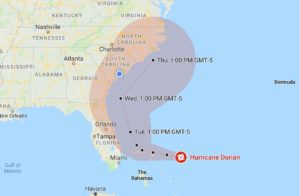When I went to sleep on Friday, Hurricane Dorian was headed toward Florida. When I rose on Saturday morning, I found that the hurricane’s path to turned north. As I write, we are directly in the path of the storm.

The storm is a good metaphor for things that happen at work that we can’t control. For example, a number of years ago, I worked on an additional project for weeks because we were told that this was important to the big boss. I still had all my other work to accomplish, and this was just layered onto my ordinary responsibilities. It was something that I couldn’t avoid, so I put my heart and soul into the project. I worked out all the details that I could, given the information available.
We held meetings with all the responsible parties and then the boss decided he was no longer interested. The storm had passed just like that. So much effort just wasted. I was tired and frustrated. I was left picking up the pieces. I didn’t ask for the storm. I didn’t seek it out. But it was over and it was time to get back to normal.
Storms happen in our personal lives too. Often, they are unexpected—the car accident, a health crisis, the IRS audit. Storms can turn our lives upside-down.
We weather all of these storms—atmospheric, work, or personal—in similar ways. Here are a few characteristics to consider.
- Most storms are irregular crises that demand your attention NOW.
- Many storms come with at least a little notice and this allows you to prepare in advance. If you are lucky enough to prepare, please make every preparation possible. Time spent upfront (preventing problems) is better than time spent on the backend (addressing the consequences). “The prudent see danger and take refuge, but the simple keep going and pay the penalty” (proverbs 22:3).
- Storms generate a lot of wasted motion. Every time a hurricane comes, we spent hours cleaning the garage, picking up all the items in the yard and storing them in the house, buying water, canned goods, and batteries. And then we wait and watch the news to see where the storm is and the intensity of the storm. We develop contingency plans for evacuation and we debate the pros and cons of leaving. We are “off” from work, but we can’t rest because were on high alert. When it’s over we took a mandatory vacation that we didn’t want. Work is backed up, we are exhausted, and our productivity has been devastated.
- In the best case scenario it was all a lot of wasted energy. It’s not like we get any real benefit from the storm. If the storm was bad, we might have to deal with damage for some time. In a worst-case scenario, we might have irreversible damage.
- The trickiest part is not knowing what will happen. That’s where the real energy drain lies.
As rational people, we know that the sun will come out again after the storm. But our immediate task is to prepare beforehand and then get through it.
So what can you do when you’re facing the storm? Whether it’s an atmospheric or metaphorical storm, the principles are the same:
- Recognize that you’re facing a storm.
- Prepare to the degree that you can.
- Make the best of the situation.
- Recognize that the storm will eventually pass.
I want to emphasize the third point because I only touched on it briefly.
At my house, while storms are an enormous waste of time, we try to salvage it the best we can by looking at the bright side. The garage is now clean and organized (a task that we couldn’t figure out how to complete all summer). The pantry is now full with weeks’ worth of canned goods. If the power goes out, we will have a barbecue before the meat in the freezer goes bad. The kids will get to stay up all night. They generally “camp out” in the living room during major storms. I have three books that I’ve wanted to read for some time that I hope to enjoy while school is closed (and I don’t even need electrical power to read them). What will you do to make the best of an undesirable situation?
What About You?
How will you plan to make the best out of storms that you face?
___________

Dr. Darin Gerdes is a tenured Professor of Management in the College of Business at Charleston Southern University.
All ideas expressed on www.daringerdes.com are his own.
This post was originally created for Great Business Networking (GBN), a networking organization for business professionals where Dr. Gerdes is the Director of Education.
___________
